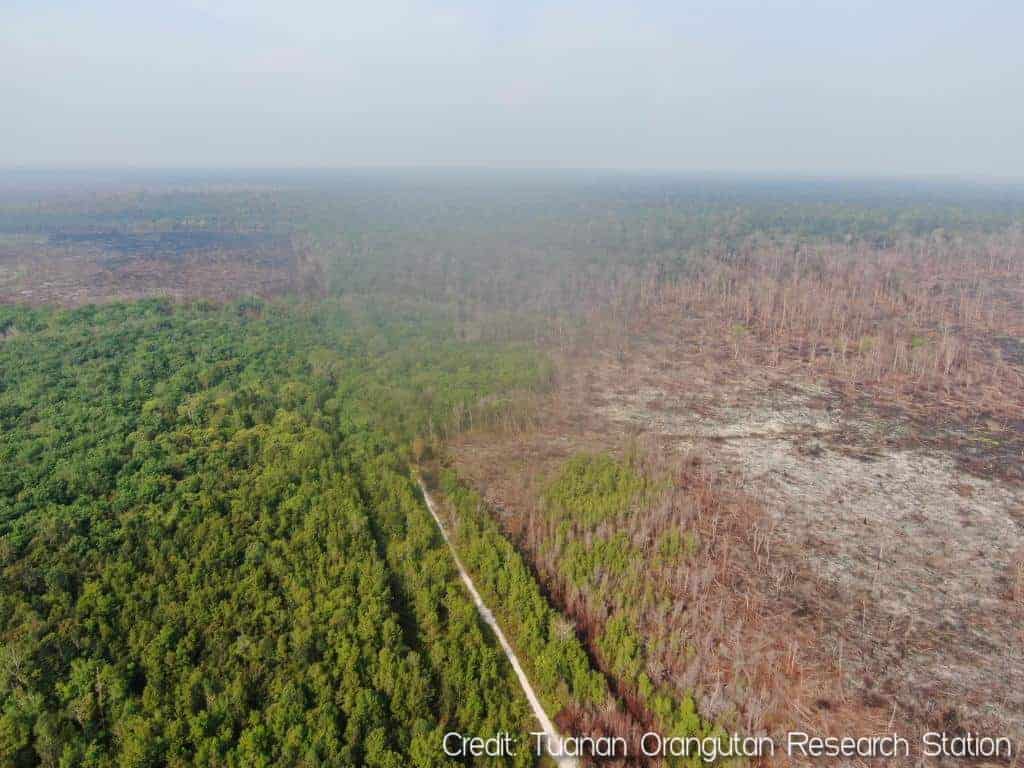Forest fires have major consequences for the rainforest, biodiversity and the climate. This year, the fires can also have consequences for those infected with the coronavirus in Indonesia and neighboring countries. Save the Orangutan has, together with our partners, taken several preventive measures to prepare for the dry season.
Forest fires are a major issue in Borneo every year during the dry season.
Already in early July this year, the Indonesian Province of Central Kalimantan declared state of emergency. Fortunately, there have so far been no major fires in the areas where Save the Orangutan operates.
Despite this, we and our partners are always prepared to secure the rainforest and the animals that live in it, including the critically endangered orangutan. The fire season this year has not been as extensive as last year, when 1.6 million hectares of land burned down. On the other hand, there is another concern regarding the health impact of the smoke from the fires as a result of the corona pandemic.
“Many experts have expressed concern about this dangerous cocktail of smoke from forest fires and the new coronavirus, which can cause serious respiratory infections, especially for the debilitated. It is very worrying and could have major consequences for humans, and possibly also animals, that become infected as the number of COVID-19 cases increases in Indonesia,” says Hanne Gürtler, Secretary General of Save the Orangutan.
According to the World Bank more than 900,000 people in Indonesia, Malaysia, and Singapore reported respiratory problems and respiratory diseases during last year’s forest fires.

Preventative work is key
This year, the forest fires are not expected to be as major as in 2019 or during the record year of 2015, when the weather phenomenon El Niño had a devastating impact. Every year, however, forest fires are a major challenge and, therefore, we constantly work to improve our preventative efforts.
“Every year, fires have consequences for biodiversity and a negative impact on the climate. That is why we prepare the firefighting efforts in collaboration with our partners, and this year we have taken even more preventive measures,” says Hanne Gürtler.
Read more about our work to protect the rainforest.
The work to prevent forest fires include building wells to facilitate fire extinguishing work when fires occur. In addition, focus is set on coordinating firefighting efforts between the local communities and the authorities. This is to ensure enough local patrol teams in the forest areas and for them to quickly be able to report to the authorities.
Therefore, we are well prepared if the fire season would be more critical than expected. Being well prepared is a necessity and it has not become less important this year. The firefighting efforts are now challenged by the corona pandemic as the firefighting efforts often involve large groups.
At the time of writing a total of 287,000 corona cases have been confirmed in Indonesia and 10,740 have died from COVID-19.
Read more about our forest programme.
Every year during the dry season, fires ravage Borneo as a result of clearing and burning of forest areas to make space for plantations. The fires during the dry season can be difficult to control as they spread and cause problems for people and animals. Additionally, the fires destroy large areas of the rainforest.
In 2019, 41% of the burned down areas were peatlands, which are some of the world’s largest carbon sinks – carbon that is released into the atmosphere when the peats burn down. The peat land forest is also one of the preferred habitats of the orangutans. Areas with peat land forests are particularly vulnerable to fires as they are often drained due to deforestation.